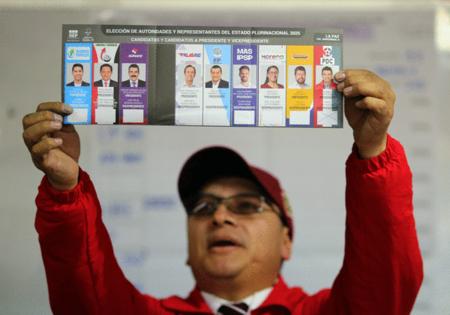Socialist era ends as pro-business candidates triumph in Bolivia
Published in News & Features
Leer en español
Voters sent two pro-business candidates to Bolivia’s presidential election runoff, ending two decades of almost-uninterrupted socialist rule and likely transforming both the nation’s economic model and its relations with Washington.
With 92% of ballots tallied, opposition senator Rodrigo Paz, 57, led with 32%, compared to 27% for Jorge Quiroga, who served as president in 2001-2002.
Paz, who massively outperformed polls that showed him coming third, fourth or fifth, has called for a more inclusive form of capitalism, according to an interview with local newspaper La Razon.
Quiroga says he would seek foreign investment in oil and gas exploration and in lithium production — Bolivia is home to the world’s largest deposits of the metal.
The election took place amid fuel and food shortages and the steepest inflation in more than three decades, which caused months of unrest and the collapse of support for the ruling socialist movement MAS. Sunday’s result is likely to be welcomed by holders of Bolivia’s dollar bonds, which have soared this year on optimism that a new government will unlock overseas credit and implement economic reforms.
Entrepreneur Samuel Doria Medina, who had led in polls, was unexpectedly pushed into third place. He conceded and said he’ll back Paz in the runoff.
Socialist senator Andrónico Rodríguez, the most prominent leftist candidate, was in fourth place with 8%.
The runoff will be held on on Oct. 19 and the new president will be sworn in on Nov. 8.
President Luis Arce opted not to run for a second term. The election is the first since 2005 when neither Evo Morales nor a hand-picked successor were on the ballot. Morales, who was barred from running, called on supporters to spoil their votes.
Morales became Bolivia’s first Indigenous president in 2006. At first, a natural gas boom allowed him to preside over strong economic growth and plunging poverty, that turned him into an icon for socialist movements across the world.
But the shine started to come off that story after 2015, when prices plummeted for Bolivia’s natural gas exports, putting the economy on track for the crisis that is hitting it today.
Under Morales and then Arce, Bolivia had close links with Venezuela, Nicaragua, Russia and China but often had sour relations with Washington.
©2025 Bloomberg L.P. Visit bloomberg.com. Distributed by Tribune Content Agency, LLC.







Comments